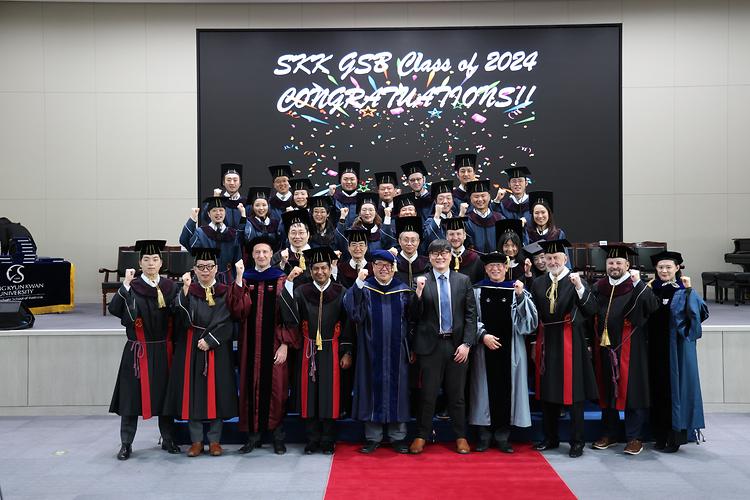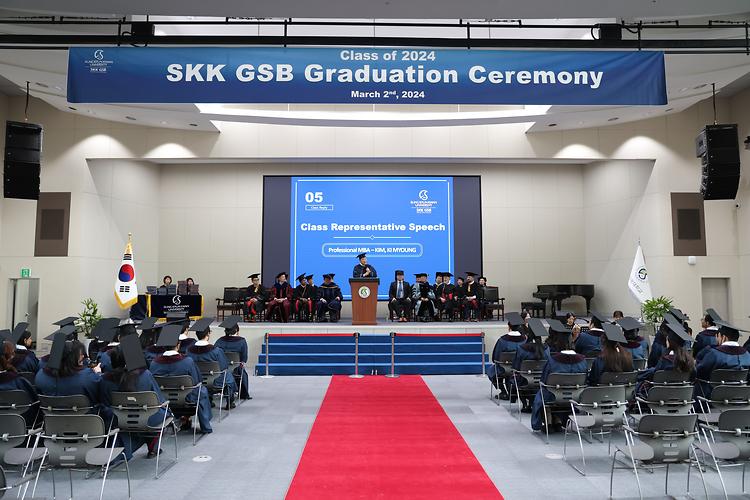-
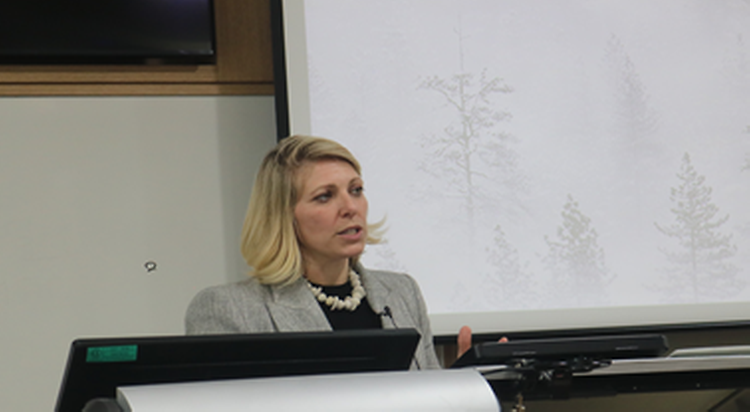
- SKK GSB Hosts Navigating the Path to Value Chain Decarbonization Forum NEW
- The second "Investing in Climate, Investing in Growth" forum of 2024, hosted by SKK GSB, took place at Sungkyunkwan University's International Hall on the 24th. Nicola Weir, Internal Sustainability and Climate Change Leader for Deloitte Asia Pacific, delivered a keynote speech titled "Navigating the Path to Value Chain Carbon Reduction" and engaged students in a lively discussion. In her speech, Weir noted the rapid development of regulations related to carbon emissions in recent years, emphasizing their strong impact on companies selling products in Europe. She stressed the need for long-term strategies aligned with value chain carbon neutrality, advising companies to envision their desired position 30 years down the road and develop strategies accordingly. Using the fashion industry as an example, Weir illustrated the concept of value chain carbon neutrality. She highlighted the industry's significant carbon footprint, accounting for 10% of global emissions, surpassing the combined emissions of all international flights and maritime transportation. This, she pointed out, presents a tremendous opportunity for carbon neutralization in the fashion industry. Weir emphasized the importance of considering carbon neutrality across the entire value chain, from design and manufacturing to distribution. Following her speech, she engaged students in a case study of the fashion industry, examining the value chains of a$3,000 luxury handbag and a $25 handbag. Deviani, a full-time MBA student who attended the forum, expressed satisfaction with the content, highlighting its relevance to current industry practices and the impressive case study session. Deviani's team, assigned to analyze the value chain of the luxury handbag, explored ways to implement carbon reduction strategies. "Our team discussed carbon reduction across all stages, from design to distribution," Deviani explained. "While the timeless design of luxury handbags doesn't significantly impact carbon emissions over time, the use of animal leather in the manufacturing process poses a challenge. We suggested improvements in bag materials as a potential solution." Lucas, another student participant, shared his insights from the forum. "Our team reviewed the value chain of fast fashion handbags," he said. "Through our discussions, we discovered that fast fashion handbags generate a significant amount of leather and fabric waste during the manufacturing process, and we believe this area requires improvement." He added, "It was fascinating to learn about the urgency of reducing carbon emissions in the fashion industry and the actions companies should take moving forward." Related Article: https://www.news1.kr/articles/5394111
-
- 작성일 2024-04-25
- 조회수 8
-
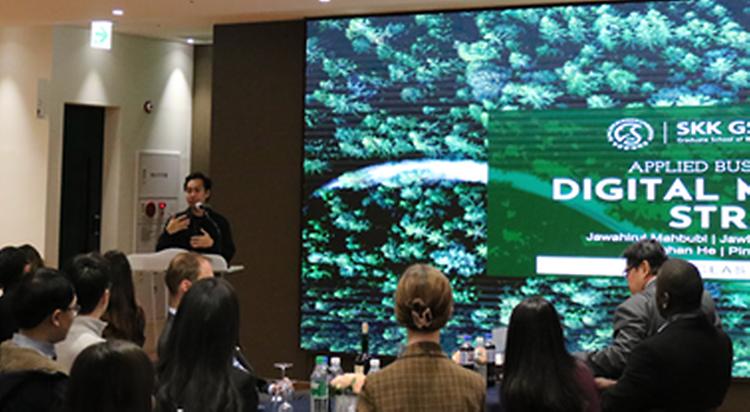
- SKK GSB introduced as the top MBA program in Korea by BusinessBecause NEW
- BusinessBecause, a provider of business school information, has highlighted Sungkyunkwan University SKK GSB. BusinessBecause emphasizes that MBA experiences can have a significant impact on personal growth and professional development beyond academics, and especially for international students, choosing a global MBA in Asia can expand their network and enhance their global competitiveness through diverse cultural experiences. Sungkyunkwan University SKK GSB, ranked #1 MBA in Korea, offers a global experience with a high proportion of international students and English-language courses. In addition, students can earn a dual degree from the Kelley School of Business at Indiana University and have the opportunity to study at prestigious business schools around the world, including MIT Sloan in the US, EDHEC Business School in France, and IE in Spain. Graduates of Sungkyunkwan University SKK GSB say that SKK GSB MBA has helped them build global careers as global recruiters increasingly value cross-cultural capabilities. Sang-hyun Joo, an alumnus who started his career in Korea before moving to the US and working at Microsoft, Accenture, and Apple, said that the MBA was a great help in building his global competitiveness. Alumna Ga-bi Yoon also said that the strong alumni network, which operates in over 60 countries, has been a valuable asset in her role as head of the Korean branch of a global company. In particular, BusinessBecause reported that Sungkyunkwan University SKK GSB operates a variety of scholarship programs, opening doors for talented individuals who want to experience Korean culture and earn a global MBA in Korea. Original Article in English: https://www.businessbecause.com/news/mba-degree/9264/study-mba-in-multiple-continents?sponsored=sungkyunkwan-university-skk-gsb https://www.businessbecause.com/news/mba-scholarships/9177/how-an-mba-scholarship-can-unlock-your-career-potential?sponsored=sungkyunkwan-university-skk-gsb
-
- 작성일 2024-04-22
- 조회수 301
-

- SKK GSB MBA Programs in Korea Economic Daily NEW
- SKK GSB Ranks No. 1 in Korea for 13 Consecutive Years in FT Global MBA Rankings SKK GSB Adds Innovative AI-Powered Courses to Curriculum Sungkyunkwan University's SKK Graduate School of Business (SKK GSB) has been ranked the No. 1 MBA program in Korea for 13 consecutive years by the Financial Times (FT) Global MBA Rankings. It also ranked 23rd in international experience and 40th in investment value among the top 100 MBA programs in the world. SKK GSB is constantly updating its curriculum and courses to reflect the latest trends in business. Recently, it has added new courses on "Business and Generative AI (AI) Utilization" and "Deep Learning for Business" to its full-time MBA program. These courses will teach students the fundamentals of AI, such as semantic search and image generation, as well as how to apply deep learning to real-world business problems, such as recommendation systems and natural language processing. "AI is both a threat to existing business practices and an opportunity to create unimagined new ones," said Eric Chui, dean of SKK GSB. "AI and business analytics are a natural fit with SKK GSB's mission and vision. We will continue to reimagine and redefine MBA education in Korea." SKK GSB offers a total of six MBA programs: Full-time MBA (1.5 years, daytime), Professional MBA (2 years, evening), Indiana University Kelley-SKK GSB EMBA (1.5 years, weekend), Business Analytics MBA (2 years, Saturday), and AI MBA (2 years, Saturday). All courses except the AI MBA are conducted 100% in English. The Full-time MBA is a representative global MBA program with over 50% international students and 60% international faculty. With the addition of the AI and business analytics tracks, students can also prepare for the future business environment. The program has dual degree tracks with Indiana University's Kelley School of Business and EDHEC Business School in France. Through the 'Dual Degree Fellowship' created last year, outstanding students can receive full domestic tuition to pursue an MBA degree from the Kelley School of Business at Indiana University. Graduates of the Full-time MBA program have gone on to achieve remarkable success. They have started new careers at leading domestic and foreign companies such as POSCO, McKinsey & Company, Amazon Web Services (AWS), and IBM. SKK GSB is also continuously strengthening its career development programs. It provides personalized career coaching and a variety of programs for students from the moment they enter the program, as well as career services from foreign experts. The Professional MBA, designed for working professionals who find it difficult to attend the Full-time MBA, is also a popular program. Students can develop their business expertise and global capabilities by taking MBA classes two to three times a week after work. After developing basic skills in their field for one year, they can choose a specific field such as marketing or finance to specialize in. The program offers two dual degree tracks: an MBA program at Indiana University's Kelley School in the US and an online Master of Science (MS) in Management program. Many students participate in the dual degree track. The Kelley-SKK GSB EMBA is a joint program between Sungkyunkwan University and Indiana University. Kelley School faculty teach the courses, and graduates receive both schools' MBAs. The Business Analytics MBA program covers business data analysis knowledge and skills from the basics to application. SKK GSB is currently accepting applications for new students in 2024 for each program. You can apply for admission information on the SKK GSB website. Original article in Korean: https://www.hankyung.com/article/2024041895371
-
- 작성일 2024-04-19
- 조회수 753
-
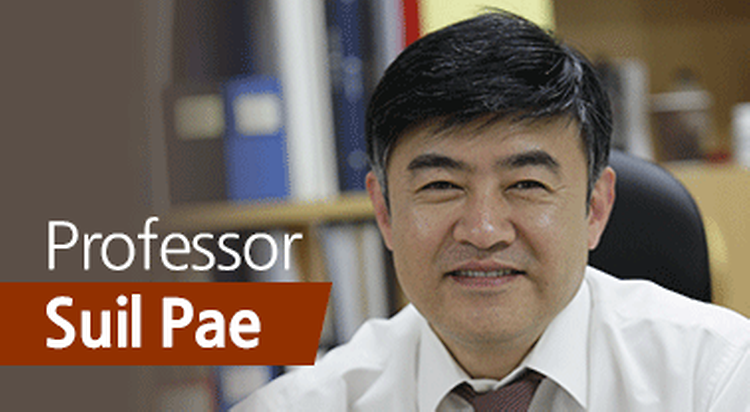
- Professor Suil Pae wins the 54th Maekyung Economist Award
- Professor Pae of SKK GSB Selected as the 54th Maeil Business Newspaper Economist Award Winner. Professor Pae published a paper titled "Career Concerns, Investment, and Management Forecasts" in the world-renowned academic journal "Accounting Review". In this paper, Professor Pae used a mathematical model to analyze how corporate investment and disclosure differ depending on the characteristics of managers. This attracted attention from the academic community and led to the award-winning achievement. According to Professor Pae's analysis, managers with general management skills tend to underinvest, while managers with specialized skills tend to overinvest. In addition, managers with general management skills were less likely to disclose earnings forecast information than managers with specialized skills, especially when their contribution to corporate value was uncertain. Professor Pae's paper attracted attention by focusing on the theoretical verification of the factors that many companies consider when selecting professional managers. The paper revealed that when professional and general management tendencies are taken to extremes, companies make inefficient investment decisions and damage corporate value. Overinvestment is a problem, but underinvestment also prevents quick responses when plant expansion or new construction is necessary, putting companies at a disadvantage in competition. Original article in Korean: https://www.mk.co.kr/news/economy/10988016
-
- 작성일 2024-04-12
- 조회수 970
-
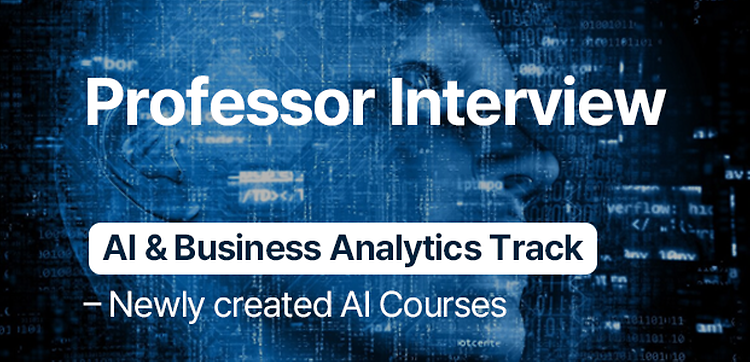
- SKK GSB Launches AI & Business Analytics Track in the Full-Time MBA Program
- SKK GSB Launches Cutting-Edge AI & Business Analytics Track in Full-Time MBA Program SEOUL, South Korea - SKK Graduate School of Business (SKK GSB) has announced the launch of its innovative AI & Business Analytics Track within its Full-Time MBA program. This new track is designed to equip students with the knowledge and skills needed to navigate the rapidly evolving landscape of Generative AI and its transformative impact on modern business. The AI & Business Analytics Track features new courses developed by SKK GSB's renowned faculty, each focusing on crucial aspects of AI and its business applications. These courses complement the school's existing Business Analytics offerings, which include courses on Business Intelligence and Data Visualization, Marketing Analytics, Finance Analytics, Digital and Social Media Analytics, Programming for Analytics, and Database Management, amongst others. In "Digital Transformation and AI Strategy," Faculty Chair for the Full-Time MBA program, Prof. Aleksios Gotsopoulos, will guide students through the challenges and opportunities presented by the AI-driven digital transformation in the modern business landscape. The course will focus on developing the strategic capabilities needed to thrive in the face of network effects, open innovation, and blurring industry boundaries. Prof. Yanbo Wang will teach "Generative AI in Business," exploring the game-changing applications of Generative AI in solving complex business problems, enhancing creativity, and driving innovation. By focusing on practical applications of Gen AI, including prompt engineering, chatbots, semantic search, image generation, and Retrieval-Augmented Generation (RAG), students will learn how to effectively implement these tools to gain a competitive edge. Prof. Serim Hwang's "Deep Learning for Business" course will provide students with a deep dive into state-of-the-art deep learning models to process and analyze large multi-modal (text, image, video) data. Throughout the course, students will explore real-world case studies and projects that demonstrate the application of deep learning in various business domains such as customer analytics, fraud detection, recommendation systems, and natural language processing. "The AI & Business Analytics Track is a testament to SKK GSB's commitment to providing our students with the most relevant and cutting-edge education in the rapidly evolving field of AI," said Professor Raunaq Pungaliya, Vice Dean for Analytics Programs. "By integrating these new courses with our existing Business Analytics offerings, we are ensuring that our graduates are well-prepared to take on leadership roles in driving AI-powered innovation and transformation within their organizations." The AI & Business Analytics Track is now accepting applications for the upcoming academic year. Prospective students can apply to the Full-Time MBA program and select the AI & Business Analytics Track to embark on a transformative educational journey at the intersection of AI and business. For more information about SKK GSB's Full-Time MBA program and the AI & Business Analytics Track, please visit Sungkyunkwan University ( SKKU ) SKK GSB | Programs | Full - Time MBA | MBA Track / Specialization | AI & Business Analytics
-
- 작성일 2024-03-22
- 조회수 1803
-
- [Graduate Comments] Su Jung Lee – "Increasing Personal Growth through the MBA Journey " (Executive MBA Class of 2024)
- Amidst the anticipation of the upcoming graduation ceremony on March 2nd, the Indiana Kelley -SKK GSB Executive MBA Program at Sungkyunkwan University Graduate School of Business prepares to bid farewell to its accomplished cohort of graduates. Despite facing numerous challenges along the MBA journey, the students reflect on their experiences with profound gratitude and pride. One such graduate, Su Jung Lee, fondly recalls her most memorable experience during the MBA journey—a transformative outdoor immersion activity in the Bloomington campus of Indiana University Kelley School of Business. Under the guidance of a former U.S. soldier turned professor, Su Jung and her peers navigated the complexities of teamwork and leadership in a dynamic outdoor setting. “As a leader, I learned how to clarify the direction and mission of the team, persuade team members, and secure the necessary resources. Metaphorically reflecting the conflicts and difficulties that may exist in real life, we gained insight into the meaning of leadership and effective teamwork through various problem-solving activities.” Reflecting on her journey, Su Jung acknowledges the initial hesitation she felt before embarking on the MBA program. However, as she nears the culmination of her studies, she realizes that her fears were unfounded, and she emerges as a better version of herself. Inspired by the supportive community fostered at SKK GSB, Su Jung expresses her pride in the accomplishments of her fellow classmates and extends heartfelt gratitude to her professors for their unwavering support and guidance. “I became interested in social phenomena such as cyber security and ESG, which I had not known in detail before, as well as global economy and politics, and it became an opportunity to look at business from a bigger picture. Additionally, I was able to expand my interests to a wider range of fields by meeting a variety of people in different industries through various networks through my classmates.” In offering her congratulatory message on SKK GSB's 20th anniversary, Su Jung echoes the sentiments of her predecessors, expressing hope for the continued success of the institution in producing outstanding leaders. “Congratulations on the 20th anniversary of SKK GSB. Just as the predecessors who have passed through GSB, I hope that SKK GSB will continue to produce more outstanding leaders in the future, and I wish for the continued success of the excellent programs that SKK GSB offers.” She commends SKK GSB for its commitment to excellence and innovation, envisioning a future where the institution continues to thrive and inspire future generations of leaders.
-
- 작성일 2024-03-06
- 조회수 2276
-
- [Graduate Comments] Ki Myung Kim - "MBA is Preparation." (Professional MBA Class of 2024)
- Ki Myung Kim, a 2024 graduate of the SKK GSB Professional MBA program, looks back on the past two years and emphasizes that "an MBA was preparation for turning unknown opportunities into success." An engineer by training, he shares how his MBA experience brought about fundamental change and the valuable lessons he learned throughout the program. "I currently work as a Partner and Account Director at Broadcom, where I primarily manage sales for the Korean and ASEAN regions. After building a 10-year career as an engineer, I transitioned to sales in 2020 and have now worked in the sales department for four years. During the first two years after my career change and before entering the SKK GSB Professional MBA program, I worked hard but didn't receive the corresponding feedback. The SKK GSB Professional MBA program allowed me to gain a deeper understanding of the challenging field of sales. Sales is a completely different world from engineering, where quick and accurate answers are required. I can now understand and apply various concepts necessary for sales activities, such as Carnivalization, Segmentation, Pricing Strategy, Marketing, Power of Money, Time Value, Channel Management, Disruptive Innovation, and Technical Advantage. Now, when I want to position a new product in the market, understand the structure and costs of various channels, and reduce distribution costs, I think more broadly and consider more factors. This is because I now have a sufficient understanding of the market competition. There is a big difference between making decisions with a full understanding of the background and implications of the decision and making decisions without it. Those who have completed an MBA program, like myself, will all agree on this point. Thanks to this, I was able to fully understand the various business models that companies use and successfully position myself in the market. As a student president, I participated in several admission information sessions. During these sessions, I received many questions about the next career step after graduation. Many people were about 'Success' and hesitated whether an MBA would really help them. I believe that hard work alone is not a sufficient condition for success. I have come to realize through experience that 'preparation' to turn unknown opportunities into success is important. I think an MBA is that 'preparation.' I learned that I need to be ready to seize any opportunity that comes my way, regardless of when or what it is. This cannot be achieved in a short time and requires continuous effort. Congratulations to all graduates, and I hope that new opportunities will come quickly and that everyone will be able to make good use of them. Congratulations on the 20th anniversary of SKK GSB. Thank you.”
-
- 작성일 2024-03-06
- 조회수 1456
-
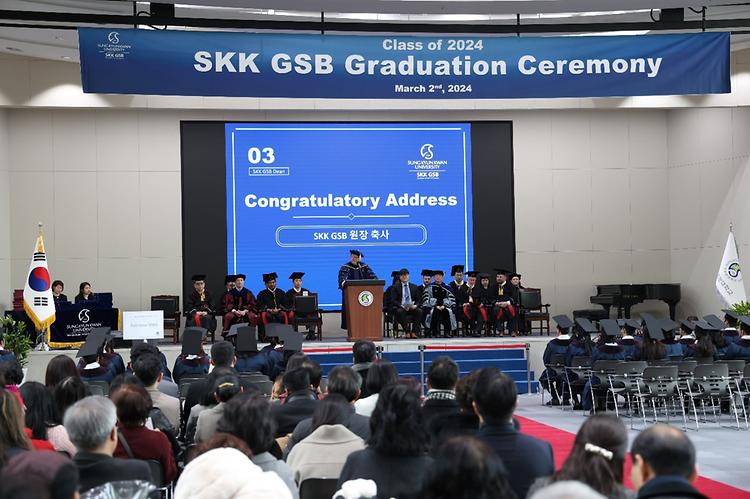
- [Graduate Comments] Full-Time MBA Class of 2024
- As the SKK Graduate School of Business commemorates its 20th anniversary, the Class of 2024 emerges as a beacon of achievement, having successfully navigated the rigorous journey of the Full-Time MBA Program. With each graduate equipped with newfound knowledge and experiences, their reflections offer profound insights into the transformative power of education and the boundless opportunities that lie ahead. Among the distinguished members of this graduating cohort is Dustin Dat Nguyen, whose journey through the MBA program has been marked by memorable experiences and profound personal growth. Reflecting on his time in the program, Dustin recalls the enriching global field trip to Taiwan as a highlight of his MBA experience. “I would say my most memorable experience during the MBA program was the global field trip that we took to Taiwan. It was nice being able to travel with my MBA classmates and see them in an environment outside of the classroom. Exploring a new country is one thing, but doing it with people whom you have grown close to throughout the course of the program is another. We drank, we dined, we laughed, and we explored together and it was an experience I will never forget.” The Full-Time MBA students visited Taiwan for an SAP course. By visiting ESG-related organizations, they were able to learn about the ESG success stories of various Taiwanese companies, and experience new food, scenery, and culture. Before embarking on this journey, he admitted to possessing limited knowledge in business fields, but enrolling in the SKK GSB Full-Time Program has enriched his knowledge through hard work and hands-on learning experiences. “I feel like the MBA gave me a crash course on everything I would need to know to succeed in business. For me, the MBA was the launchpad for a career transition. Before coming to this program, I knew nothing about finance, accounting, or business analytics. Now having taken all these classes, I feel like my world has expanded and I have so much knowledge regarding business and how it is conducted. I can definitely say that there wasn’t a single day in the program where I didn’t learn something new or useful.” The student expresses his congratulatory message regarding SKK GSB’s 20th anniversary. “To the SKK GSB, here’s hoping for another 20 years of excellence! And let’s hope AI doesn’t replace all of us by that time!” says Dustin. Student Hyun Bin Jung is another great example of how SKK GSB has changed her insights about the business world. Prior to embarking on the MBA journey, the student acknowledges possessing a theoretical understanding of domestic and international economic situations. However, they candidly admit to facing challenges in applying this knowledge to real-life scenarios. “Previously, I knew about domestic and international economic situations and economic theories, but it was not easy to apply them to real life and incorporate what I knew into my work. Through these MBA courses, I think I have developed the ability to apply theory to real life and incorporate it into my work. Also, since all classes are conducted in English, I think my ability to communicate and express my opinions in English has also improved. Furthermore, I think I was able to develop a broader global mindset through team projects and school life with friends from various countries.” Hyun Bin also leaves us with a congratulatory message for SKK GSB: “Congratulations on your 20th anniversary! I hope that we will continue to have good programs and talented students participate in the Sungkyunkwan University GSB program, thereby creating a strong alumni base.” As the SKK GSB celebrates the achievements of its graduating class, it is evident that the Full-Time MBA Program has empowered individuals like Dustin and Hyun Bin to embark on transformative journeys of personal and professional growth.
-
- 작성일 2024-03-06
- 조회수 1343
-
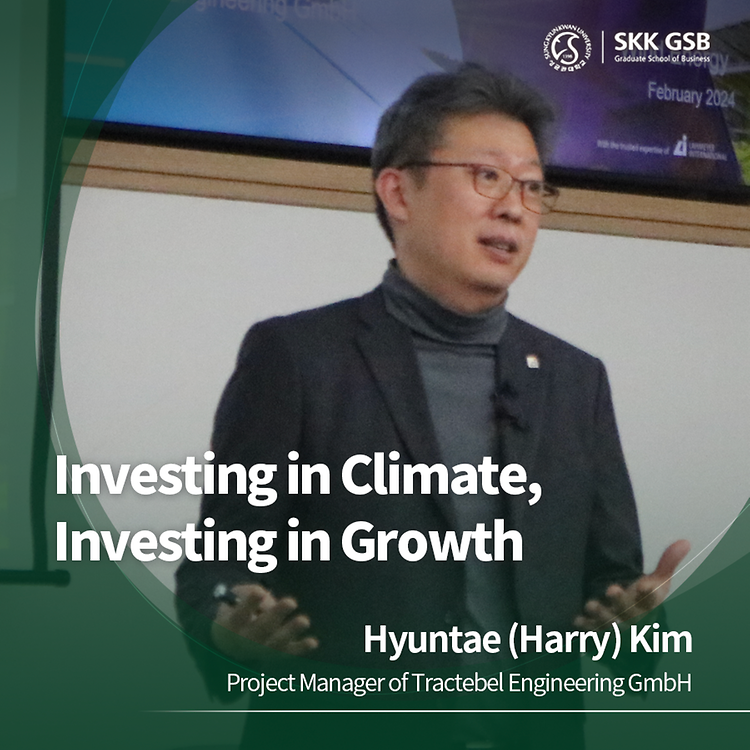
- SKK GSB, 'Investing in Climate, Investing in Growth' ICIG Forum
- SKK GSB's forum on "Investing in Climate, Investing in Growth" was held at Sungkyunkwan University's International Hall on February 7th. The forum begins with Hyuntae (Harry) Kim’s lecture on " Upscaling of Wind Farms." Mr. Hyuntae Kim is the Project Manager of Tractbel Engineering GmH. SKK GSB's perspective on climate change diverges from seeing it solely as a crisis but rather as an opportunity. The evolving landscape of climate change worldwide presents a canvas for technological innovation, fostering a corporate ecosystem. Climate change propels them to swiftly adapt and innovate for sustained growth. In the forum titled "Upscaling of Wind Farm," Mr. Hyuntae Kim illuminated the intricate challenges encountered by applying the business plan to the environmental dynamics inherent in wind farm projects domestically. His discourse offered profound insights into the entire Wind Farm Development Procedure, spanning from manufacturing processes to turbine installation and project completion. Andrew Burger is a full-time MBA student who is from the United States, expressed that "Kansas is a much flatter state and therefore has built large wind farm complexes throughout the entire state. Currently, around 40% of its power grid is supplied by this wind power with wind turbine farms being located in the western part of the state. Any time I traveled to Colorado or beyond, there would be hours of driving past these large complexes and seeing large blades while traveling.” Andrew asked a lot of enthusiastic questions during the lecture and shared “I asked about how the wind power construction firms have been dealing with the changes in the South Korea bond markets. It was interesting to see how the loan agreements of a sustainable project are different from what Shinsegae, Hyundai, and Taeyoung typically use. The Korean construction market has faced some challenges in recent years so learning about the financial risks and obligations of a sustainable power project was insightful to hear about." Andari Candrika, another full-time MBA student during the forum stated “Attending the ICIG Forum on Upscaling Wind Farms was an eye-opening experience. I especially enjoyed how Mr. Hyuntae Kim provided technical insights into the wind farm industry. His perspective highlighted both the business and engineering challenges in wind farms, which I hadn't fully grasped before. Seeing the engineering side was particularly fascinating, as it's not typically emphasized in business school. Overall, the forum enriched my understanding of wind energy's complexities and its broader implications.” The SKK GSB Climate Investment and Growth Investment Forum is held every year both offline and online. The next forum will be held on April 24th 2024, another topic related to sustainability. SKK GSB will invite industry experts, high-tech companies, and investment experts related to climate change in the global market to deliver a lecture and chair a forum along with Prof. Yongju Nielsen.
-
- 작성일 2024-02-28
- 조회수 1253
-
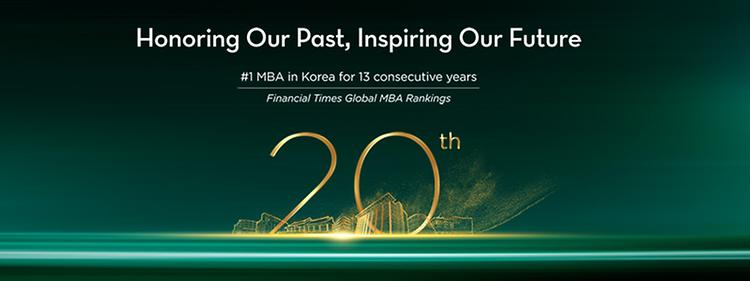
- 2024 FT Global MBA Rankings - SKK GSB, #1 MBA in Korea for 13 consecutive years
- Dear SKK GSB Community, This year, we are celebrating the 20th anniversary of SKK GSB. I would like to take this moment to reflect with gratitude on the journey we have embarked upon since our founding in 2004. It started with just one program, 36 students, and ten faculty members who shared a vision of creating a world-class institution. We have grown remarkably since then to boast six top graduate programs, 400 talented students, and 22 distinguished faculty members. This growth results from our dedication to meet the evolving needs of the global business landscape and our students' diverse aspirations. Our excellence in business education is globally recognized and underscored by our 13 consecutive years of ranking among the top programs worldwide by the Financial Times. As we celebrate this significant milestone, I am grateful for the collective effort and dedication that has brought us to where we are today. Our achievements are not just a reflection of our faculty's excellence, the commitment of our staff, or the quality of our programs. It is also a testament to our students' and alumni's hard work, determination, and can-do spirit. Together, we have built a vibrant community that extends far beyond the walls of our school—a global network of professionals and business leaders united by a common vision of making a positive impact. Although our past achievements inspire us, we are even more excited about the opportunities that lie ahead. SKK GSB’s commitment to excellence remains unwavering, as does our dedication to fostering a community of learners and leaders who are equipped to navigate and shape the future of business. I extend my heartfelt thanks to our faculty, students, alums, and partners for being integral to our journey. Together, we will continue to set new standards in business education and contribute to the betterment of society on a global scale. Best regards, Eric Shih
-
- 작성일 2024-02-13
- 조회수 3770











